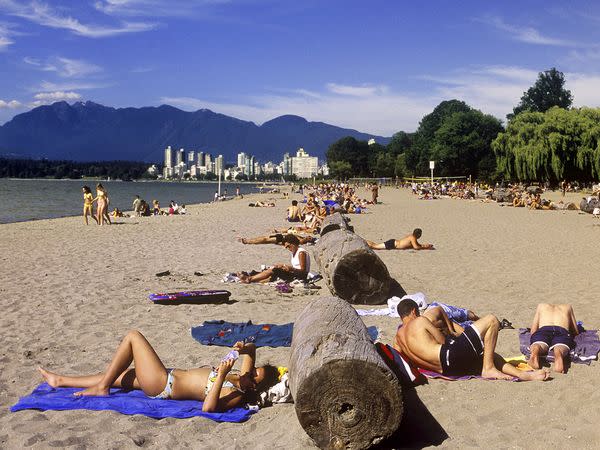Vancouver most expensive city in Canada

Canada’s most adventurous metropolis is home to ten beaches, from the family-centric Jericho to the clothing-optional Wreck Beach, many of which offer commanding views of the Vancouver skyline and majestic North Shore Mountains. Sporty types prefer Kitsilano or “Kits,” a six-minute drive from downtown, for its free tennis and basketball courts, and its super-size heated saltwater pool. (Photolibrary)
Vancouver has eclipsed Toronto as the most expensive city in Canada for expatriates looking to relocate, but it’s nowhere near the priciest place to set down roots, according to a new report.
According to Mercer’s 2013 Cost of Living Survey, Vancouver ranks as the world’s 64th most expensive city among 214 locales that were financially dissected for everything from monthly housing costs to the tab for a cup of coffee. Toronto previously held the top Canadian spot at No. 61.
While Mercer released only a smidgen of its data on Tuesday - its detailed report is for sale to multinationals keen to send employees to far-flung places - the global consulting firm said every Canadian city it studied, including Montreal, Calgary and Ottawa, fell slightly in the annual rankings.
Luc Lalonde, who is a Montreal-based principal with Mercer, said it’s “not a dramatic year-over-year” decline, but he chalked it up to a weakening Canadian dollar against the U.S. dollar. And, he said the prices for goods and services didn’t rise as quickly as those in New York – the city used as a baseline for the annual study, which used data gathered last March against U.S exchange rates.
While most Canadians know that Vancouver isn’t cheap, it looks positively affordable compared with the places among the top 10.
Luanda in Angola, a major oil-producing nation in Africa, is now considered the most costly, according to the firm, which crunched data for more than 200 everyday costs, including housing, transportation, groceries, clothing and services.
In Luanda, the monthly rent for a two-bedroom luxury apartment rings in at $6,500 (all figures U.S.) and a pair of jeans will set you back $204.41. Expats require secure housing there, which comes with a premium, and imported foreign goods don’t arrive cheaply, Mercer said.
Moscow, which ranked second, has sky-high food and incidental costs such as $8.29 for a cup of coffee, $7.59 for a litre of milk and $9.95 for an international newspaper.
Tokyo, which was last year’s most expensive city, fell to third due largely to its slumping currency. The top five also included Ndjamena in Chad and Singapore.
Hong Kong ranked sixth, but its cost for accommodations was through the roof compared with other pricey postal codes. A three-bedroom unfurnished luxury home would set a family back $13,538.68 per month, while a two-bedroom apartment has a month rental rate of $7,091.69.
The Swiss cities of Geneva, Zurich and Bern also made the cut, as did Sydney, Australia, where a movie ticket costs $19.62, and rounded out the top 10.
The survey is designed as a guide for international human resources departments, but employees might find it instructive before they get stars in their eyes about international postings.
“It’s really important to have a dialogue with your employer before you take any assignment,” Mr. Lalonde said. “Typically employers will absorb any cost difference… The employee is typically no better off or no worse off.”
Vancouver’s relatively high ranking is just the latest sign of the lavish lifestyle for residents of the West Coast paradise.
The Conference Board of Canada released its latest look at home sales on Tuesday and reported that a residential property in Vancouver typically sold for $750,778 in June. That’s up 8.8 per cent from the year before and is 0.9 per cent higher than the month before.
The Vancouver Sun recently cited the high cost of housing as contributing to waning enrollment in city-area schools, where classes are shrinking by about 600 students a year. Families are moving out to the cheaper suburbs of Coquitlam, Surrey and Langley, where of course, student numbers are now soaring.

 Yahoo Finance
Yahoo Finance 
